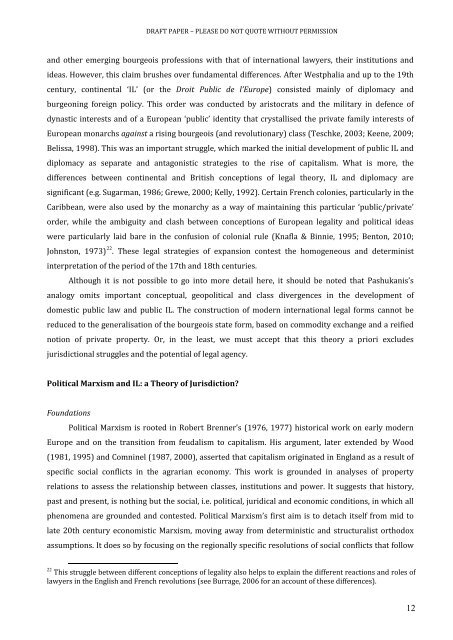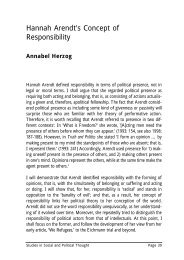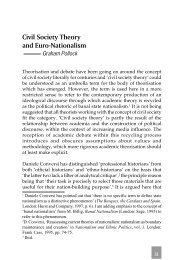Historical Materialism and International Law - University of Sussex
Historical Materialism and International Law - University of Sussex
Historical Materialism and International Law - University of Sussex
You also want an ePaper? Increase the reach of your titles
YUMPU automatically turns print PDFs into web optimized ePapers that Google loves.
DRAFT PAPER – PLEASE DO NOT QUOTE WITHOUT PERMISSION<br />
<strong>and</strong> other emerging bourgeois pr<strong>of</strong>essions with that <strong>of</strong> international lawyers, their institutions <strong>and</strong><br />
ideas. However, this claim brushes over fundamental differences. After Westphalia <strong>and</strong> up to the 19th<br />
century, continental ‘IL’ (or the Droit Public de l’Europe) consisted mainly <strong>of</strong> diplomacy <strong>and</strong><br />
burgeoning foreign policy. This order was conducted by aristocrats <strong>and</strong> the military in defence <strong>of</strong><br />
dynastic interests <strong>and</strong> <strong>of</strong> a European ‘public’ identity that crystallised the private family interests <strong>of</strong><br />
European monarchs against a rising bourgeois (<strong>and</strong> revolutionary) class (Teschke, 2003; Keene, 2009;<br />
Belissa, 1998). This was an important struggle, which marked the initial development <strong>of</strong> public IL <strong>and</strong><br />
diplomacy as separate <strong>and</strong> antagonistic strategies to the rise <strong>of</strong> capitalism. What is more, the<br />
differences between continental <strong>and</strong> British conceptions <strong>of</strong> legal theory, IL <strong>and</strong> diplomacy are<br />
significant (e.g. Sugarman, 1986; Grewe, 2000; Kelly, 1992). Certain French colonies, particularly in the<br />
Caribbean, were also used by the monarchy as a way <strong>of</strong> maintaining this particular ‘public/private’<br />
order, while the ambiguity <strong>and</strong> clash between conceptions <strong>of</strong> European legality <strong>and</strong> political ideas<br />
were particularly laid bare in the confusion <strong>of</strong> colonial rule (Knafla & Binnie, 1995; Benton, 2010;<br />
Johnston, 1973) 22 . These legal strategies <strong>of</strong> expansion contest the homogeneous <strong>and</strong> determinist<br />
interpretation <strong>of</strong> the period <strong>of</strong> the 17th <strong>and</strong> 18th centuries.<br />
Although it is not possible to go into more detail here, it should be noted that Pashukanis’s<br />
analogy omits important conceptual, geopolitical <strong>and</strong> class divergences in the development <strong>of</strong><br />
domestic public law <strong>and</strong> public IL. The construction <strong>of</strong> modern international legal forms cannot be<br />
reduced to the generalisation <strong>of</strong> the bourgeois state form, based on commodity exchange <strong>and</strong> a reified<br />
notion <strong>of</strong> private property. Or, in the least, we must accept that this theory a priori excludes<br />
jurisdictional struggles <strong>and</strong> the potential <strong>of</strong> legal agency.<br />
Political Marxism <strong>and</strong> IL: a Theory <strong>of</strong> Jurisdiction?<br />
Foundations<br />
Political Marxism is rooted in Robert Brenner’s (1976, 1977) historical work on early modern<br />
Europe <strong>and</strong> on the transition from feudalism to capitalism. His argument, later extended by Wood<br />
(1981, 1995) <strong>and</strong> Comninel (1987, 2000), asserted that capitalism originated in Engl<strong>and</strong> as a result <strong>of</strong><br />
specific social conflicts in the agrarian economy. This work is grounded in analyses <strong>of</strong> property<br />
relations to assess the relationship between classes, institutions <strong>and</strong> power. It suggests that history,<br />
past <strong>and</strong> present, is nothing but the social, i.e. political, juridical <strong>and</strong> economic conditions, in which all<br />
phenomena are grounded <strong>and</strong> contested. Political Marxism’s first aim is to detach itself from mid to<br />
late 20th century economistic Marxism, moving away from deterministic <strong>and</strong> structuralist orthodox<br />
assumptions. It does so by focusing on the regionally specific resolutions <strong>of</strong> social conflicts that follow<br />
22 This struggle between different conceptions <strong>of</strong> legality also helps to explain the different reactions <strong>and</strong> roles <strong>of</strong><br />
lawyers in the English <strong>and</strong> French revolutions (see Burrage, 2006 for an account <strong>of</strong> these differences).<br />
12
















